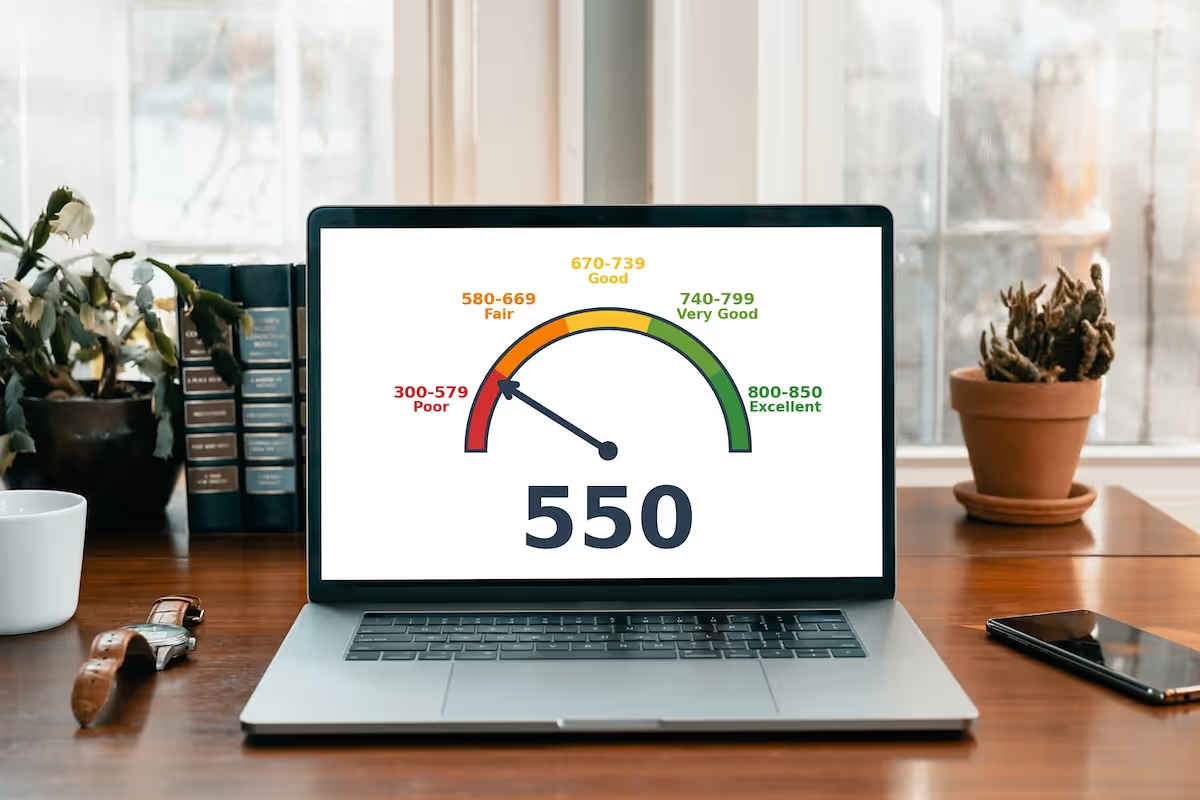
Kudos has partnered with CardRatings and Red Ventures for our coverage of credit card products. Kudos, CardRatings, and Red Ventures may receive a commission from card issuers. Kudos may receive commission from card issuers. Some of the card offers that appear on Kudos are from advertisers and may impact how and where card products appear on the site. Kudos tries to include as many card companies and offers as we are aware of, including offers from issuers that don't pay us, but we may not cover all card companies or all available card offers. You don't have to use our links, but we're grateful when you do!
550 Credit score: What You Need to Know in 2025
July 1, 2025


TL;DR
A 550 credit score is a starting point with significant room for growth, placing you in a prime position to build a stronger financial foundation. According to the FICO model, this score falls within the “poor” range, highlighting a clear path forward for improving your creditworthiness.
What Does a 550 Credit Score Mean?
A credit score of 550 places you in the "poor" range on the FICO Score scale, which runs from 300 to 850. Lenders generally consider scores below 580 to be subprime, signaling a higher-risk borrower. This isn't just a label; it's a reflection of your credit history that directly influences your financial opportunities and how creditors perceive your reliability.
With a 550 score, you'll likely face higher interest rates on loans and credit cards, making borrowing more expensive. Securing approvals for mortgages, car loans, or even apartment rentals can be a significant challenge. While this presents financial hurdles, a credit score is not permanent. Understanding your current standing is the crucial first step toward navigating your financial path forward.
Who Has a 550 Credit Score?
Credit scores often follow a predictable pattern, generally increasing with age. According to 2023 data from Experian, the average FICO score varies significantly across different generations:
- Generation Z (ages 18-26): 680
- Millennials (ages 27-42): 690
- Generation X (ages 43-58): 709
- Baby Boomers (ages 59-77): 745
- Silent Generation (ages 78+): 760
Credit Cards With a 550 Credit Score
A credit score of 550 falls into the "poor" credit range, which can significantly impact your ability to qualify for traditional credit cards. Most major issuers may view you as a high-risk borrower, leading to automatic denials for their premium or even standard card offerings. Your most likely options will be secured credit cards that require a cash deposit or unsecured cards specifically designed for bad credit, which often come with high annual fees and interest rates.
Kudos can help you find the best card for your financial situation with its AI-powered tools that personalize recommendations based on your preferences, such as a need for low interest rates or specific rewards. Its Explore Tool lets you compare options from a database of nearly 3,000 cards, helping you find a suitable match for your credit profile.
Auto Loans and a 550 Credit Score
A 550 credit score places you in the subprime lending category, which means while you can still get an auto loan, the terms will be less favorable. You should expect to face significantly higher interest rates, increasing your total borrowing cost over the life of the loan.
According to a 2025 analysis, average auto loan rates are broken down by the following credit score brackets:
- Super-prime (781-850): 5.25% for new cars and 7.13% for used cars
- Prime (661-780): 6.87% for new cars and 9.36% for used cars
- Non-prime (601-660): 9.83% for new cars and 13.92% for used cars
- Subprime (501-600): 13.18% for new cars and 18.86% for used cars
- Deep subprime (300-500): 15.77% for new cars and 21.55% for used cars
Mortgages at a 550 Credit Score
A 550 credit score significantly limits your mortgage options, making you ineligible for most conventional and jumbo loans. Your primary path to homeownership will likely be through an FHA loan. These government-backed loans accept scores as low as 500, but you'll need a minimum 10% down payment if your score is below 580. While some other specialty programs exist, an FHA loan is the most common route for borrowers in this credit range.
Securing a loan with a 550 score means facing less favorable terms. Expect higher interest rates, which substantially increase the total cost of your mortgage over time. With an FHA loan, you'll also pay higher mortgage insurance premiums. Lenders may cap your loan amount and will likely require a more detailed review of your finances through manual underwriting.
What's in a Credit Score?
Figuring out what goes into your credit score can feel like trying to solve a complex puzzle, but it's primarily based on a handful of key financial habits. The most common factors include:
- Your payment history tracks whether you have paid past credit accounts on time.
- Credit utilization is the percentage of your available credit that you are currently using.
- The length of your credit history considers the age of your oldest account and the average age of all your accounts.
- Having a healthy mix of credit types, such as credit cards and installment loans, can positively impact your score.
- Recent credit inquiries and newly opened accounts can temporarily lower your score.
How to Improve Your 550 Credit Score
No matter your current standing, your credit score isn't set in stone; it's always possible to improve your financial health with consistent effort. There are several proven methods to boost your creditworthiness and build a healthier profile over time.
- Monitor your credit reports. This allows you to spot and dispute any errors or fraudulent activity that could be dragging down your score. For someone with a 550 score, correcting inaccuracies can provide a significant and immediate boost.
- Set up automatic bill payments. This simple step ensures you never miss a due date, which directly improves your payment history—the single most important factor in your credit score. Consistent, on-time payments are crucial for rebuilding a low score.
- Lower your credit utilization ratio. High balances are a common reason for low scores, so paying down debt to get below the recommended 30% threshold can quickly raise your score. This shows lenders you can manage your available credit responsibly.
- Become an authorized user. By being added to an account with a long, positive credit history, you can "piggyback" on their good habits. This can add positive payment history and account age to your own report, helping to offset a low score.
To help you maximize rewards while you build your credit, the Kudos browser extension can recommend the best card for every purchase.
Unlock your extra benefits when you become a Kudos member

Turn your online shopping into even more rewards

Join over 400,000 members simplifying their finances

Editorial Disclosure: Opinions expressed here are those of Kudos alone, not those of any bank, credit card issuer, hotel, airline, or other entity. This content has not been reviewed, approved or otherwise endorsed by any of the entities included within the post.



































.webp)



.webp)



.webp)

